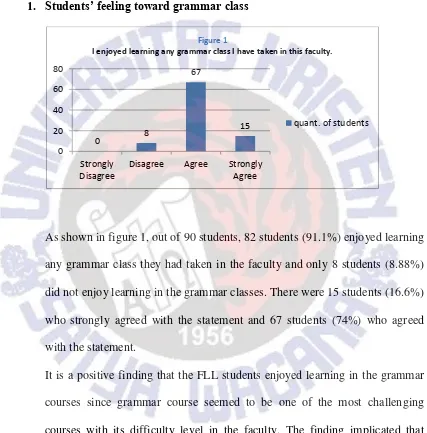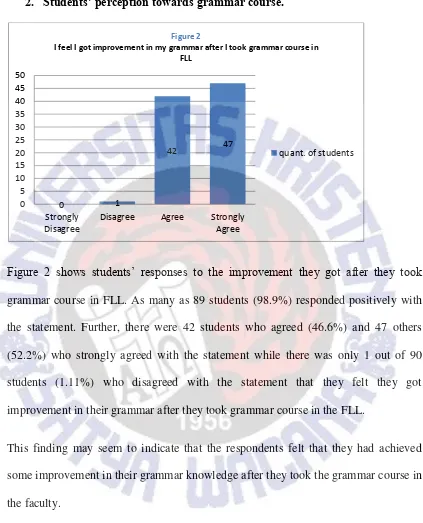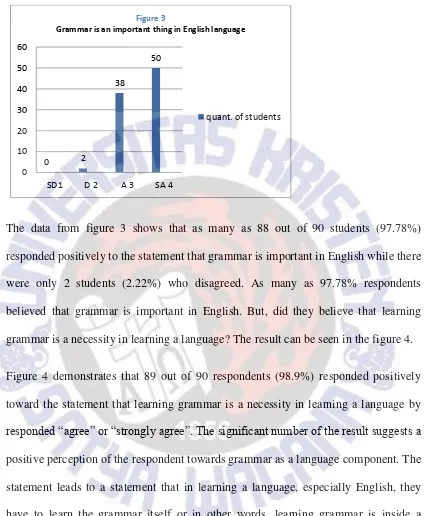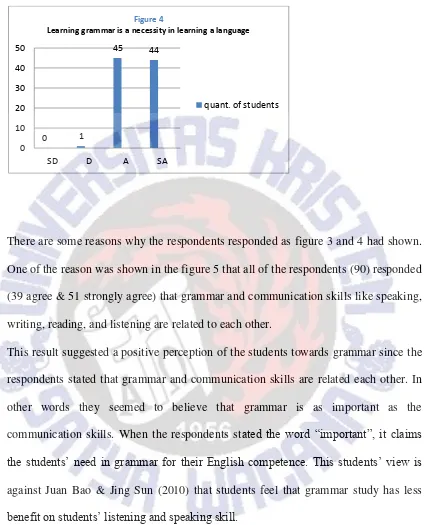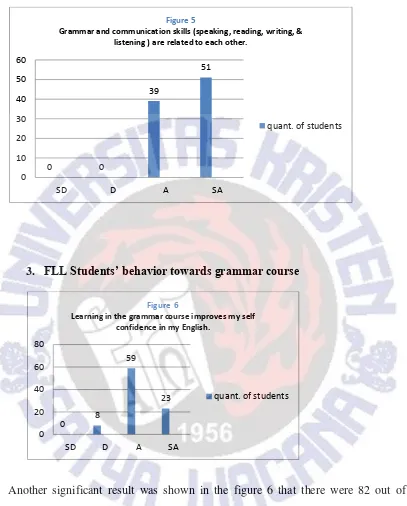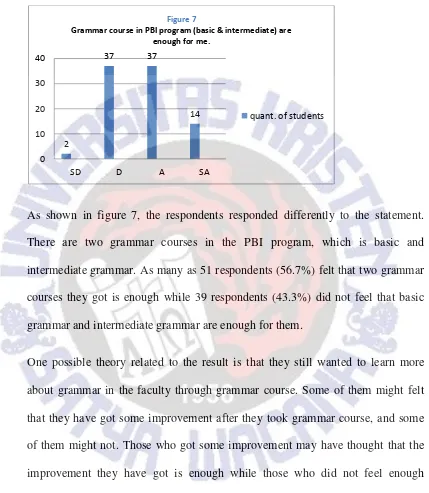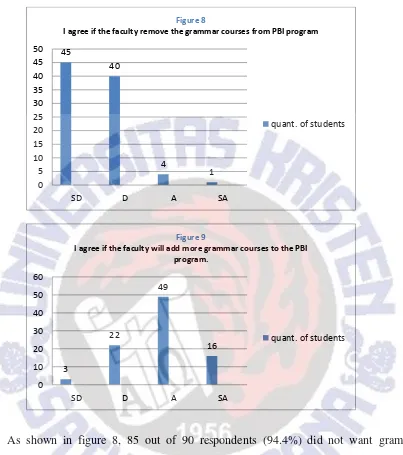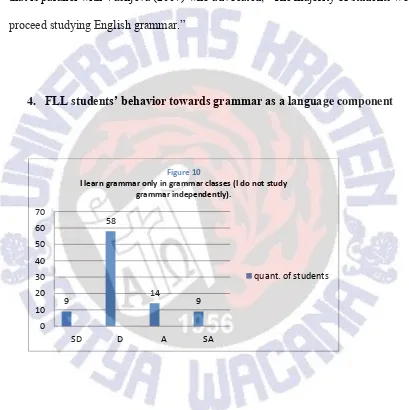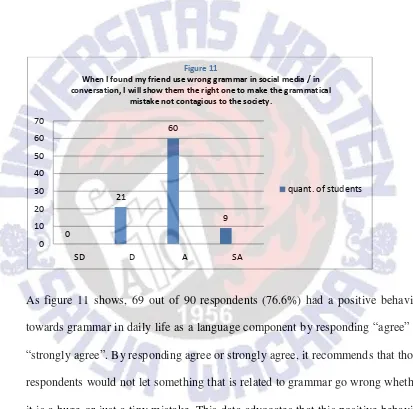FLL STUDENTS’ ATTITUDES TOWARD GRAMMAR AS A
COURSE AND AS A LANGUAGE COMPONENT
THESIS
The thesis is submitted in partial fulfillment of the requirements for the degree of
Sarjana Pendidikan
Vinsensius Gilang Cahya Pradana
112011095
ENGLISH LANGUAGE EDUCATION PROGRAM
FACULTY OF LANGUAGE AND LITERATURE
SATYA WACANA CHRISTIAN UNIVERSITY
SALATIGA
i
FLL STUDENTS’ ATTITUDES TOWARD GRAMMAR AS A
COURSE AND AS A LANGUAGE COMPONENT
THESIS
The thesis is submitted in partial fulfillment of the requirements for the degree of
Sarjana Pendidikan
Vinsensius Gilang Cahya Pradana
112011095
ENGLISH LANGUAGE EDUCATION PROGRAM
FACULTY OF LANGUAGE AND LITERATURE
SATYA WACANA CHRISTIAN UNIVERSITY
SALATIGA
vi
Table of Contents
Inside Cover Page……...………...………...……..………..i
Pernyataan Tidak Plagiat………ii
Pernyataan Persetujuan Akses………....………..……….iii
Lembar Persetujuan Pembimbing………...……….………..iv
Lembar Pengesahan………....v
Table of Content……….……...…………vi A. INTRODUCTION ... 1
1. Present Research Problem ... 1
2. Research Question ... 2
3. Purpose of the Research ... 2
4. Significance of Research ... 2
B. LITERATURE REVIEW ... 3
1. Definition of Grammar ... 3
2. Concept & Theories Related to the Problem ... 4
3. Different Authors’ Points of View ... 5
4. About the Problem from Previous Study ... 7
1a. Previous Studies ... 7
5. Students’ Perception about Grammar ... 8
C. METHODOLOGY SECTION ... 9
1. Method ... 9
2. Participants ... 9
3. Research Instrument ... 10
4. Data Collection ... 10
D. FINDINGS AND DISCUSSION ... 11
1. Students’ feeling toward grammar class ... 11
2. Students’ perception towards grammar course. ... 12
3. FLL Students’ behavior towards grammar course ... 15
4. FLL students’ behavior towards grammar as a language component ... 18
E. CONCLUSION ... 21
Acknowledgement ... 23
vii
1
understanding. The same finding has also been found by Vasiljeva(2007) who
has done a research about reasons why the first year students of upper
secondary school studied English grammar. In her research, students stated
that they studied English grammar because it improved their knowledge of
English language (Latvian 60%, Swedish 69%) and that it helped them to
express themselves in correct grammar (Latvian 58%, Swedish 75%).
Moreover 46% Latvian students and 34% Swedish students reported that they
study English grammar because it helped them to understand spoken and
written English. In the same research, students also stated that they would
proceed studying grammar if they have the opportunity.
Evidence about the problem people usually found in grammar of a
language was proposed by Akurugu (2010). He declared that the falling
standard of English has become a source of worry to many well meaning
individuals and the Ghanaian society as a whole. People of Ghana have bad
grammar that leads him to a conclusion that people are giving lesser attention
to English Language. The other evidence was stated by Myyry (2013) that
2
clear picture of what grammar instruction actually is, they certainly harbor
many different feelings about it nevertheless.
Though some people see grammar important in English, some others see
grammar not that important as long as people can deliver the meaning of their
language.
2. Research Question
What are the students’ attitudes toward grammar?
3. Purpose of the Research
The purpose of this study was to explore the attitudes of FLL students
toward grammar as a lesson and as a language component. Further, this study
explored what the students will do if they like, hate, avoid, or want to learn
more about grammar classes. This study also explored how they deal with the
importance of grammar as a language component.
4. Significance of Research
The result of this study will show students’ attitudes toward grammar
as an academic component and toward grammar in general outside the campus
as a language component. It will show how FLL students deal with grammar
inside campus as a lesson and outside campus as a language component. From
this study, we could discover whether FLL learners like, hate, avoid, or want
3
From this study, we will know whether FLL students like learning
grammar or hate learning grammar. This study also showed the improvements
achieved by the students after taking the grammar courses. This study also
investigated whether the students thought that grammar is an important thing
and necessity in English. This study also investigated whether the students
thought that the grammar courses in the PBI program are enough for them.
Further, this study investigated the students’ attitudes toward grammar outside
the campus.
B. LITERATURE REVIEW
1. Definition of Grammar
Patrick Hartwell (1985), author of Grammar, Grammars, and the Teaching of
Grammar, categorizes grammar into four definitions. Based on one of these is, “Grammar is a set of formal patterns in which the words of a language are arranged in
order to convey a larger meaning.” p.(352-353). Another definition of grammar was
also stated by Janice Neuleib (2007). Janice Neuleib (2007) defines grammar as, "The
internalized system that native speakers of a language share"(Neuleib, p.349). This
definition allows grammar to take on several forms beyond the linguistic and formal
writing processes. Grammar rules used in formal and informal communication are
4
2. Concept & Theories Related to the Problem
Nagaratnam & Al-Mekhlafi (2011) stated that for the most part, within the
classroom, any mention of grammar causes the student moments of discomfort and
sometimes even terror. Due to this problem, many teachers have tried to make
grammar teaching a non-threatening, imaginative and useful activity within the
English curriculum.
Usually, English language learners have a perception that English grammar is
the most difficult part in English language learning. Jean and Simard (2011)
discovered that both students and teachers considered grammar instruction to be very
useful but not very entertaining. Jean and Simard (2011) also stated that student feels
grammar instruction to be difficult or confusing for them to understand because of
many factors like the large number of the language rules in grammar.
Though teachers and learners agreed that grammar is very useful but not very
entertaining, as the different subject, they will have different attitudes and feelings
toward grammar learning. This kind of differences can lead language learning to be
ineffective if both of the learners and teachers can not find the right problem solving
plan.
Some factors can cause an impact on grammar learning and mostly, it affected learners’ way of thinking first. After affecting the learners’ way of thinking, it will
affect the English language learning easily since learners are the subjects who learn
5
persuade the learners’ feeling and attitudes into a positive way so the learners will
have motivation in learning grammar of a language.
The students’ attitudes are not the thing that could not be changed or fixed.
Once the students have the positive attitudes toward grammar, they will see grammar
as a necessity and enjoyable course that will lead them to a good result. To get the
better attitudes of the students, the faculty and the teacher should create the effective
curriculum. One thing that will support the effectiveness of the curriculum is the
instruction as suggested by Rubina Kousar, Pir Mehr (2009). Rubina Kousar, Pir
Mehr (2009) claims that direct instruction is teacher-centered instruction, like expository teaching, that seeks to change students’ behavior by way of changing his
thoughts. Their theory is supported with the results of the present study which indicate
that traditional instruction did not have as much significant impact on learning
English grammar as Direct Instruction because of the effective use of time in
maintaining students' attention, more teacher-directed instructions, and active presentation of information. From this finding, learners’ attitude and feeling can be
caused by instruction used by the teachers. The easier the instruction, the better the students’ attitude will be.
3. Different Authors’ Points of View
Antti Myyry (2013) stated that though her research has a small number of
participants (13 first year high school students in Finland), they serve to remind
teachers of the fact that students may have a range of different feelings about a
6
attitudes, and perceptions, the more the participants, the more variety of responses we
get.
Thompson, A. & Nakatsukasa, K. (2007) stated that “although there was only
one significant difference between the Foreign Language groups, all of the analyses
showed interesting trends: The Foreign Language learners who have studied more
than one second language like grammar, have a more positive attitude towards language learning.”
We knew that most of FLL students studied more than one second language. All of
the students studied Indonesian and a local language. Some students even speak more
than one local language. According to the findings by Thompson and Nakatsukasa
(2007), those kinds of students who speak and studied more than one second language
will have more positive attitude toward language learning. In language learning, the
students learn some components of a language like grammar, structure, vocabulary,
etc. The problem is that usually learners put grammar into the bottom list of the
learning a language, learners need to learn about grammar because grammar is a rule
7
the secured feeling in their language competence that will lead them to positive
attitudes toward grammar.
4. About the Problem from Previous Study
1a. Previous Studies
Nagaratnam & Mekhlafi (2011) stated, “For the most part, within the
classroom, any mention of grammar causes the student moments of discomfort and sometimes even terror.” It is not a good thing for English Language Teaching, but that
is what actually happened in the past few years. To be known as a difficult thing to
learn, grammar may cause the feeling of discomfort for the students. For something
that is difficult, the department should find the best way to deliver the material in a
fun and easy way that the students like.
Jolanta Vasiljeva (2007) found the majority of Swedish upper secondary
school students (91% Latvian, 90% Swedish) would proceed studying English
grammar, while 9% of the Latvian students and 10% of the Swedish students would
prefer not to have any further grammar studies. It indicates that both Latvian and
Swedish students have a positive attitude towards grammar learning. From this
finding, she also discovered that though Latvian students have more frequent lessons
during a week time, they showed a positive attitude towards grammar as they would
8
Jolanta Vasiljeva (2007) has shown from her research that there are some reasons
why students study English grammar as follows. Students state that they study
English grammar because it improves their knowledge of English language (Latvian
60%, Swedish 69%) and that it helps them to express themselves grammatically
correctly (Latvian 58%, Swedish 75%). Moreover 46% Latvian students and 34%
Swedish students state that they study English grammar because it helps them to
understand spoken and written English.
5. Students’ Perception about Grammar
Jolanta Vasiljeva (2007) also has the other result from her research about students’ perception in grammar. When asked their opinion on whether they perceive
that their knowledge of English improves due to studies of English grammar 92% of
the students from either country give a positive answer whereas 8% state that they do
not believe it.
This finding is a good evidence that according to the students, grammar is important in language learning and by studying grammar, students’ English knowledge will
improve significantly.
Thompson, A., & Nakatsukasa, K. (2007) in their seminar the University of
Sterling, Scotland, stated that students agreed with the statement, “Learning a foreign
language is mostly a matter of learning a lot of grammar rules.” I am surely agree
with their statement that in learning a foreign language, we must learn the grammar
9
C. METHODOLOGY SECTION
1. Method
This quantitative study examines the FLL students’ attitudes toward grammar
classes in the FLL and grammar in general as a language component in the daily life.
This quantitative study used a structured method that is questionnaires with
closed-ended questions.
FLL students (English Teaching program) will have two grammar classes in their
program (Basic Grammar, and Intermediate Grammar). The lesson they get from the
grammar classes will be used in their daily life. The grammar lesson they get can
improve their language skills especially their grammar pattern. Every student will
have a different perception and attitudes toward grammar class and grammar in
general as a language component.
2. Participants
Ninety (90) students from the Faculty of Language and Literature majoring
English Teaching participated in the study. The students were from 2014 class years
10
representatives in this research. There was no gender, age and race qualification.
Every student has the different experience in learning grammar class.
3. Research Instrument
In this research, the data was collected through four-point Likert scale
questionnaire. The questionnaire consisted of 14 questions that were divided into five
parts. The first part is about their feeling towards grammar class. The second part is
about their perception in grammar. The third part is about their behavior toward
grammar as a class/course. The fourth part is about their behavior toward grammar as a language component. The fifth part is about the students’ behavior toward grammar
as a class and as a language component.
4. Data Collection
First, I looked for 90 participants and the participants were given questionnaires to
fill. The participants were chosen based on convenience sampling as long as they are
in the 2014 English Teaching students. With convenience sampling, the participants
were already available and agree to participate in the study. All of the participants
were taking Current Issues in Second Language Teaching (CISLT) class. I distributed the questionnaires in the CISLT class by asking the teachers’ permission first.
After we obtained the data from the questionnaires, the data were analyzed with
descriptive analytic method using Microsoft excel software. The percentages of the
11
D. FINDINGS AND DISCUSSION
1. Students’ feeling toward grammar class
As shown in figure 1, out of 90 students, 82 students (91.1%) enjoyed learning
any grammar class they had taken in the faculty and only 8 students (8.88%)
did not enjoy learning in the grammar classes. There were 15 students (16.6%)
who strongly agreed with the statement and 67 students (74%) who agreed
with the statement.
It is a positive finding that the FLL students enjoyed learning in the grammar
courses since grammar course seemed to be one of the most challenging
I enjoyed learning any grammar class I have taken in this faculty.
12
2. Students’ perception towards grammar course.
Figure 2 shows students’ responses to the improvement they got after they took
grammar course in FLL. As many as 89 students (98.9%) responded positively with
the statement. Further, there were 42 students who agreed (46.6%) and 47 others
(52.2%) who strongly agreed with the statement while there was only 1 out of 90
students (1.11%) who disagreed with the statement that they felt they got
improvement in their grammar after they took grammar course in the FLL.
This finding may seem to indicate that the respondents felt that they had achieved
some improvement in their grammar knowledge after they took the grammar course in
the faculty.
I feel I got improvement in my grammar after I took grammar course in FLL
13
The data from figure 3 shows that as many as 88 out of 90 students (97.78%)
responded positively to the statement that grammar is important in English while there
were only 2 students (2.22%) who disagreed. As many as 97.78% respondents
believed that grammar is important in English. But, did they believe that learning
grammar is a necessity in learning a language? The result can be seen in the figure 4.
Figure 4 demonstrates that 89 out of 90 respondents (98.9%) responded positively
toward the statement that learning grammar is a necessity in learning a language by responded “agree” or “strongly agree”. The significant number of the result suggests a
positive perception of the respondent towards grammar as a language component. The
statement leads to a statement that in learning a language, especially English, they
have to learn the grammar itself or in other words, learning grammar is inside a
package of learning a language.
0 2
Grammar is an important thing in English language
14
There are some reasons why the respondents responded as figure 3 and 4 had shown.
One of the reason was shown in the figure 5 that all of the respondents (90) responded
(39 agree & 51 strongly agree) that grammar and communication skills like speaking,
writing, reading, and listening are related to each other.
This result suggested a positive perception of the students towards grammar since the
respondents stated that grammar and communication skills are related each other. In
other words they seemed to believe that grammar is as important as the
communication skills. When the respondents stated the word “important”, it claims
the students’ need in grammar for their English competence. This students’ view is
against Juan Bao & Jing Sun (2010) that students feel that grammar study has less benefit on students’ listening and speaking skill.
0 1
Learning grammar is a necessity in learning a language
15
3. FLL Students’ behavior towards grammar course
Another significant result was shown in the figure 6 that there were 82 out of 90
(91.1%) respondents who responded that they improved their confidence in using
English after they learned grammar in the grammar course. The lesson they got in the
grammar course gave them more knowledge about English language. Their
confidence in their English was raised as they got more knowledge from the grammar
course as supported by Vasiljeva (2007), ”Students state that they study English
grammar because it improves their knowledge of English language” .
0 0
Grammar and communication skills (speaking, reading, writing, & listening ) are related to each other.
quant. of students
Learning in the grammar course improves my self confidence in my English.
16
As shown in figure 7, the respondents responded differently to the statement.
There are two grammar courses in the PBI program, which is basic and
intermediate grammar. As many as 51 respondents (56.7%) felt that two grammar
courses they got is enough while 39 respondents (43.3%) did not feel that basic
grammar and intermediate grammar are enough for them.
One possible theory related to the result is that they still wanted to learn more
about grammar in the faculty through grammar course. Some of them might felt
that they have got some improvement after they took grammar course, and some
of them might not. Those who got some improvement may have thought that the
improvement they have got is enough while those who did not feel enough
improvement wanted to get more improvement as they can from grammar course.
2
Grammar course in PBI program (basic & intermediate) are enough for me.
17
As shown in figure 8, 85 out of 90 respondents (94.4%) did not want grammar
courses to be removed from curriculum. While in figure 9, 65 out of 90 respondents
(72%) wanted the faculty to add more grammar course to the PBI program. The data
demonstrate that 22% respondents wanted the faculty to keep the remaining grammar
courses in the PBI program (basic & intermediate) or in other words, they assumed
that they did not need more grammar course in the PBI program. The data confirmed
that 94.4% FLL PBI students wanted grammar courses to be kept in the curriculum of
the PBI program though less number of the respondents (72%) wanted the faculty to
add more grammar course to the curriculum of the PBI program. The finding is in
I agree if the faculty remove the grammar courses from PBI program
quant. of students
I agree if the faculty will add more grammar courses to the PBI program.
18
accordance with Farjami (2012) who claims, “Majority of the learners disagreed with
removing explicit grammar teaching from the curriculum.”
As shown in figure 9, 72% students wanted the faculty to add more grammar class that is parallel with Vasiljeva (2007) who advocated, “The majority of students would
proceed studying English grammar.”
4. FLL students’ behavior towards grammar as a language component
As shown in the figure 10, as many as 67 (74%) respondents responded by choosing “Disagree” or “strongly disagree” with the statement that they did not study grammar
independently while the rest 26% or 23 respondents chose agree or strongly agree
I learn grammar only in grammar classes (I do not study grammar independently).
19
This kind of students must have enjoyed the grammar lesson and understood the
purpose of grammar lesson. This indicates that the students had a positive attitude
towards grammar as a course and as a language component. This finding supports Ahmed’s (2015) idea that students know what they want in language class. They are
attentive of their needs and ready to go further to get their needs. The students’ needs
here is the knowledge of the grammar that will help them survive in the English
Education world and it makes the students want to study grammar outside the class.
Another result that as many as 23 respondents studied grammar only in class and did
not study grammar independently is also a result that should be considered. Studying
grammar only in class did not necessarily mean that the respondents were too lazy to
study grammar outside the class. There was a possibility that they may felt that the
grammar courses they had in the faculty were enough for them.
This finding was not good for the faculty since the students do not study
independently. But something like this does not always become a problem. To see the
positive side, we should consider about the amount of the grammar lesson. It is not
just about the quantity, but also about the quality. If the faculty and the teacher can
deliver the good quality lesson with a shorter period, why should they deliver the
standard quality lesson with a longer period? It was supported by Rubina Kousar, Pir
Mehr (2009) who affirmed that, “traditional instruction did not have as much
significant impact on learning English grammar as Direct Instruction because of the
effective use of time in maintaining students' attention, more teacher-directed
20
With the high quality lesson they got from the teachers in two grammar courses, the
students may assume that they did not need to study the lesson outside the class since
they had felt a significant impact in the class.
As figure 11 shows, 69 out of 90 respondents (76.6%) had a positive behavior
towards grammar in daily life as a language component by responding “agree” or
“strongly agree”. By responding agree or strongly agree, it recommends that those
respondents would not let something that is related to grammar go wrong whether
it is a huge or just a tiny mistake. This data advocates that this positive behavior
towards grammar as a language component can be their key to be a good English
Teacher since they won’t let any kind of mistakes spread to the society of English
Education world. The result shows that majority of students (76.6%) do not want
there is a mistake in linguistic aspects as supported by Thompson & Nakatsukasa
0
When I found my friend use wrong grammar in social media / in conversation, I will show them the right one to make the grammatical
mistake not contagious to the society.
21
(2007) who claim, ”FL learners who have studied more than one second language
have a higher desire for linguistic correctness.” All of FLL students speak
Indonesian and at least one more local language and some of them have more than
one local language, so what Thompson & Nakatsukasa (2007) said can be related
with the findings.
E. CONCLUSION
The study notifies the positive attitudes of FLL students especially PBI program
students towards grammar courses and towards general grammar as a language
component. The majority of PBI students have a really positive feeling, perception
and also behavior toward grammar course in the faculty and also towards grammar in
general as a language component. This study also proved Thompson & Nakatsukasa’s
(2007) idea that students who has studied more than one second languages have more
positive attitudes toward language learning, have higher desire for linguistic
correctness, and like grammar more as all of the FLL students have studied more than
22
The finding of the study could be a good thing for the students and also the Faculty of
Language and Literature as Samadani & Ibnian (2015) who stated that students with
more positive attitudes have higher GPA. If what Samadani & Ibnian (2015) stated is
correct, then the majority of PBI program students in FLL must have a pleasing GPA.
As the students responded that they did not want the faculty to remove the grammar
course and most of them want more grammar course to be added in the program, it
would be a good thing if the faculty keep at least 2 grammar courses in the curriculum
23
Acknowledgement
Praise and great gratitude to Almighty God for bless me and help me to
complete this thesis on time.
This thesis is arranged to fulfill the requirements for obtaining Sarjana
Pendidikan degree, in English Education Program, Faculty of Language and
Literature, Satya Wacana Christian University Salatiga.
On this occasion, I would like to thank all of those who help and guide me so
this thesis can be finished. Completion of writing the thesis, the author would like to
thank to:
1. Prof. Dr. John A. Titaley, Th.D. as the Rector of Satya Wacana Christian
University Salatiga.
2. Drs. Antonius Wahyana, M.A. as the Dean of the Faculty of Language and
Literature.
3. Christian Rudianto, M. Appling. as the Head of English Education Program.
4. My best gratitude to Elisabet Titik Murtisari, Ph.D. as my supervisor in this
thesis for her helps, direction, and guidance that are very useful and helpful for
the writing of the thesis starting from the preparation until it is finished.
5. Martha Nandari, M.A as my examiner in this thesis for the direction, guidance,
and advice so I could finish this thesis on time.
6. Prof. Dr. Gusti Astika, Anne I. Timotius, M.Ed. , Annita Kurniawati, M.Hum
as the teachers of Current Issues in Second Language Teaching class for gave
24
7. The biggest thanks for all of the English Teaching Program students from
2014 class year for being my respondents. With their help in fulfilling the
data, this thesis can be finished on time.
Salatiga, April 2016
Vinsensius Gilang Cahya Pradana
112011095
25
References:
Ahmed, S. (2015). Attitudes towards English Language Learning among EFL
Learners at UMSKAL. Journal of Education and Practice www.iiste.org ISSN
2222-1735 (Paper) ISSN 2222-288X (Online) Vol.6, No.18, 2015.
Al Samadani, H.A. & Ibnian, S.S. (2015). The Relationship between Saudi EFL Students’ Attitudes towards Learning English and their Academic Achievement. International Journal of Education and Social Science, Vol. 2 No. 1, pp. 92-102.
Akurugu, B. M. (2010). The attitudes and perceptions of students about the study of
English grammar: The case of selected senior high school students in northern region. Diss.Kwame Nkrumah University of Science and Technology.
Bao, J. & Sun, J. (2010). English Grammatical Problems of Chinese Undergraduate Students
Foreign Language Department, Liaoning Technical University.
Farjami, H. (2012). The effect of academic study on grammar attitude, grammar motivation, and perception of grammar relevance.
Hartwell, P. (I 985a). Grammar, grammars, and the teaching of grammar. College Education 47(2), 105-127.
Jean, G., and Simard, D. (2011). Grammar teaching and learning in L2: Necessary,
but boring? Foreign Language Annals, 44(3), 467-494.
Kousar, R.& Mehr, P. (2009). The effect of direct instruction model on intermediate
class achievement and attitudes towards English grammar. Diss. Pir Mehr Ali Shah Arid agriculture university, Rawalpindi Pakistan
Myyry, A. (2013).The dark side of the moon: High school students’ perceptions of
grammar instruction.
Nagaratnam, R.P. & Mekhlafi, A. M. (2011), Difficulties in teaching and learning
grammar in an EFL context. International Journal of Instruction. 4 (2).
Neuleib, J. & Brosnahan, I. (2007). Approaches to Grammar Instruction: Teaching
Developmental Writing. Ed. Susan Naomi Berstein. New York: Bedford/ St. Martin‟s,.Print
Thompson, A., & Nakatsukasa, K. (2007). Students’ motivation for language learning
26
Vasiljeva, J. (2007). English Grammar, like it or not: A study of the attitudes towards
the importance of teaching and learning English grammar in Latvia and Sweden.
APPENDIX
RESEARCH INSTRUMENTS
I am an English Department student and now I am doing a research on the FLL students’ attitude towards grammar. The purpose of this research is to find out about
the FLL students’ attitude towards grammar course in the faculty and grammar in
general in daily life outside the course as a language component.
Please fill in the questionnaire below honestly with your own answer by putting a
checkmark on the column provided. Any of your answer will not affect your grade.
Thank you.
SA=Strongly Agree, A=Agree, D=Disagree, and SD=Strongly Disagree
NIM :
Languages I speak :
27
1 I enjoy learning any grammar class I have taken in
this faculty. (Feeling)
2 Learning in the grammar class give me a kind of
security in my language skills and knowledge
(Feeling)
3 I feel I got improvement in my grammar after I took
grammar course in FLL (Perception)
4 Grammar is an important thing in English language
(Perception)
5 Learning grammar is a necessity in learning a
language (Perception)
6 Grammar and communication skills (speaking,
reading, writing, & listening) are related to each
other. (Perception)
7 I do not agree when someone say, “Grammar is not
important as long as we can communicate very well.” (Perception)
8 Learning in Grammar course improves my self
confidence in my English. (Behavior-class)
9 Grammar courses in PBI program (basic &
intermediate) are enough for me. (Behavior-class)
10 I learn grammar only in grammar classes (I do not
28
11 I agree if the faculty remove the grammar courses
from PBI program. (Behavior-class)
12 I agree if the faculty will add more grammar courses
to the PBI program. (Behavior-class)
13 When I found my friend use wrong grammar in
social media / in conversation, I will show them the
right one to make the grammatical mistake not
contagious to the society. (Behavior-lang
component)
14 My motivation in learning grammar is to be good in
English because grammar is the key to be good in
English.(Behavior-lang component)
If you would like to be interviewed further, please fill in your contact below!
Name :
Phone number :
Email :
Questionnaire
29
This question examine whether the students enjoy learning in grammar class
or not.
2. Learning in the grammar class give me a kind of security in my language skills
and knowledge
This question examines the students’ secured feeling when they learn in the
grammar class.
3. I feel I got improvement in my grammar after I took grammar course in FLL
This question examines the students’ attitudes towards grammar after they
take the grammar class.
4. Grammar is an important thing in English language
This question examines students’ perception and attitude toward the role of
grammar in learning English language.
5. Learning grammar is a necessity in learning a language
This question examine students’ attitude towards the relation between
grammar learning and language learning.
6. Grammar and communication skills (speaking, reading, writing, & listening)
are related to each other.
This question examine whether the students think that grammar is as important
as communication skills (speaking, listening, reading, writing) in English.
7. I do not agree when someone say, “Grammar is not important as long as we can communicate very well.”
This question will examine the students’ attitude toward grammar as the
language component.
30
This question examine the students’ attitude after they learn in the grammar
class, whether they got any self confidence improvement or not.
9. Grammar courses in PBI program (basic & intermediate) are enough for me.
This question examines the students’ need and willing in learning grammar in
grammar class.
10.I learn grammar only in grammar classes (I do not study grammar
independently).
This question will examine the students’ behavior toward grammar classes
whether they learn it only in class or also outside the class even when the class
is over.
11.I agree if the faculty remove the grammar courses from PBI program.
This question examine the students’ attitude if there will be no grammar class
in the faculty.
12.I agree if the faculty will add more grammar courses to the PBI program.
This question examine the students’ attitude if there will be more grammar
class in the faculty.
13.When I found my friend use wrong grammar in social media / in conversation,
I will show them the right one to make the grammatical mistake not
contagious to the society.
This question will explore students’ attitude toward grammar in general
outside the grammar class.
14.My motivation in learning grammar in the grammar classes is to be good in
English because grammar is the key to be good in English.
